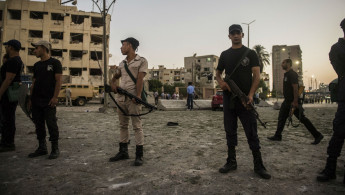Egypt terrorism law 'enshrines permanent emergency'
Human Rights Watch [HRW] has condemned Egypt’s new anti-terror bill, which was passed by President Abd al-Fattah al-Sisi on Sunday.
The global rights group said on Wednesday that the law give authorities additional powers to impose heavy sentences, including the death penalty, for crimes under a definition of terrorism that is so broadly worded it could encompass civil disobedience.
“With this sweeping new decree, Egypt’s president has taken a big step toward enshrining a permanent state of emergency as the law of the land,” the HRW statement added.
| With this sweeping new decree, Egypt’s president has taken a big step toward enshrining a permanent state of emergency as the law of the land - Human Rights Watch |
The US State Department said on Tuesday that it was "concerned" that the law could have a "significant detrimental impact on human rights and fundamental freedoms."
Yehia Qalash, head of the Egyptian Journalists’ syndicate, spoke critically of the act on television Wednesday night, saying, “The national press should play a role in fighting terrorism; it is our duty. Unfortunately, this new law restricts are ability to undertake this role and instead provides a platform for terror-affiliated media outlets to disseminate their extremism.”
The 54-article bill orders stiff sentences for a range of crimes and establishes new "special" courts.
The Egyptian government responded to the international and local criticism of the law and released a statement to clarify the new counter-terrorism law.
The Egyptian Foreign Ministry also insisted that other countries should “respect the independence of the [Egyptian] judiciary.”
“Egypt never commented on laws passed by other countries to counter terrorism, and which were viewed by many citizens of those countries as a restriction on freedoms,” a statement said.
On Thursday, the Islamic state group claimed responsibility for a massive car bomb explosion near a national security building in Cairo which wounded at least 29 people.





 Follow the Middle East's top stories in English at The New Arab on Google News
Follow the Middle East's top stories in English at The New Arab on Google News
![Israeli forces ordered bombed Gaza's Jabalia, ordering residents to leave [Getty]](/sites/default/files/styles/image_330x185/public/2176418030.jpeg?h=a5f2f23a&itok=_YGZaP1z)

